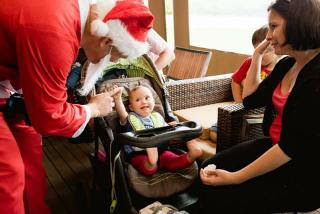In 2014, 32 year old Chris Lategan, an art director and movie props master, came face-to-face with one of the fears many of us dread...cancer. Diagnosed with a rare brain tumour which left him blind, Chris was admitted to Tygerberg Hospital for surgery. Despite being thrilled to have his sight back after a successful operation, one of the things Chris' visually-trained eyes first took in was the dreary state of the hospital's walls, particularly in the paediatric ward he occasionally passed.
Filled with an overwhelming sense of gratitude for the positive outcome of his treatment, Chris envisioned an initiative whereby he could pay it forward (a sentiment originally offered by Dr Burke - the anaesthetist who oversaw Chris' care in theatre), in the most creative way he knew how...art. And so, barely back on his feet, Chris shared on Facebook his idea of adding some much-needed colour and character to the walls of Tygerberg Hospital's paediatric ward. Friends, volunteers and sponsors immediately jumped on board, as did the Daniel and Friends Fund, and so followed the very first Painting It Forward project.
Eager to make the project an annual event, the Painting It Forward team got together again in August this year to debate its next possible project and after much deliberation settled on the Tygerberg Hospital School. Tygerberg Hospital School not only ensures that all children undergoing treatment, regardless of the duration, are able to stay up to date with their school work, but also provides specialised classes for children who struggle with Apraxia. A meeting with Tygerberg Hospital School's principal, Susan Potgieter, and a quick tour of the school left us not only in awe of how efficiently the school is managed with such limited resources, but with a very clear idea of which area would most benefit from the Painting It Forward project...the school entrance, which did little justice to the remarkable efforts being made within the heart of the school.
Once again the generosity from sponsors, volunteers and artists alike was overwhelming and a truly heartwarming process to be a part of. With the outstanding donations and sponsorships from Quality Paint Supplies, Franco Frazzita, Premier Scaffolding, AFS Productions, PEG Design and Oh So Pretty Event Planning, the incredible talent and commitment of the artists who painted the murals and the willingness and dedication of the volunteers to take care of the 'ground work', it was a project deemed for awesomeness. The excitement and pure delight captured on the childrens' faces when seeing the murals for the first time was the final affirmation of what a rewarding experience it had been.
The "before" picture
The walls needed to be scraped, sanded, washed
and then painted with a base coat before the artists
could begin their murals.
Harmonious chaos as everyone gets stuck in
And finally the walls are prepped for the artists to begin
The artists painted a base graphic and volunteers
jumped in to "colour in" while the artists
concentrated on perfecting the intricate details
Susan Potgieter, principal of the Tygerberg
Hospital School, adds her artistic contribution
SOME OF THE FINISHED MURALS :
Jodique Fortune's space turtle
Ludolph Pretorius' uniquely styled mural of Red Riding Hood
(completed on the Monday)
Chris Venter worked till 4am on the Monday morning to complete
his amazing mural of Karla Krullebol. Visit
Chris Venter Illustration to view more of Chris' talented work
Dorette Walters also pushed through till 4am to complete her
beautiful Aladdin mural
Hardus Jonker's larger-than-life mural One Piece
Maxine Koen's underwater delight - Dory and Nemo
Shoana Jones and Jason Fortune effortlessly put
a man in space
Taygen Hendrikz beee-utifully painted work
Elouise Milburn's magical unicorn
Renier van der Vyver strikes a pose with his SpongeBob
Olivia Stone's breath-taking mural of How To Train Your Dragon,
which took three straight days to complete
Sandie Gie's awesome mural of Inside Out
Without these fabulous organisations and their generous donations
and support, the Painting It Forward project would not have
been the roaring success it was - we humbly thank you :
Quality Paint Supplies
Franco Frazzita
Premier Scaffolding
AFS Productions
PEG Design
Oh So Pretty Event Planning
Vanessa and Marko Speck from Quality Paint Supplies
who not only donated all the exceptional-quality colour
paint, but popped in on both Saturday and Sunday and
then again to watch the children seeing the murals for
the first time.
Some of the amazing Painting It Forward 2015 team
The Daniel and Friends Fund, together with one of
our newest partners Michelle Phillips from
Synchronize Systems (and our on-site medic for the
weekend) wish to congratulate Chris Lategan on
the wonderful success he achieved with
Painting It Forward 2015! We look forward to what
2016 brings for this inspiring initiative.
And the proof, as they say, is in the pudding...



















































